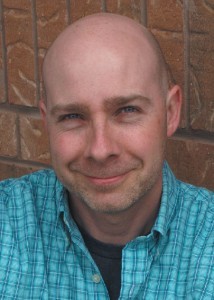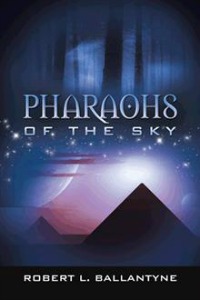Title: Pharaohs of the Sky
Author: Robert L. Ballantyne
Publisher: iUniverse
ISBN: 9781491765272
Pages: 288
Genre: Science Fiction/Suspense
Interviewed by: Allison Walker
About The Author
 Rob Ballantyne lives with his family in Innisfil, Ontario. Pharaohs of the Sky is his first novel. Born in Stratford, Ontario in 1974, I studied English and Film with a minor in history at the University of Western Ontario, London, Ontario, from 1995-1999. From there, I left for a year in South Korea to teach ESL, then returned to enter teachers’ college, again at Western. I then left again, in the summer of 2002, this time for Colombia and another teaching opportunity. When I returned, having found no job, I moved to South Korea for a second and final time. Upon returning in August 2004, I landed a job at Huron Heights Secondary School in Newmarket, Ontario, where I remain to this day. I teach English and history. Tonia (my wife) and I have two young children: Charlotte and Henry.
Rob Ballantyne lives with his family in Innisfil, Ontario. Pharaohs of the Sky is his first novel. Born in Stratford, Ontario in 1974, I studied English and Film with a minor in history at the University of Western Ontario, London, Ontario, from 1995-1999. From there, I left for a year in South Korea to teach ESL, then returned to enter teachers’ college, again at Western. I then left again, in the summer of 2002, this time for Colombia and another teaching opportunity. When I returned, having found no job, I moved to South Korea for a second and final time. Upon returning in August 2004, I landed a job at Huron Heights Secondary School in Newmarket, Ontario, where I remain to this day. I teach English and history. Tonia (my wife) and I have two young children: Charlotte and Henry.
PBR: Pacific Book Review (PBR): Today we have the privilege to talk with author Robert L. Ballantyne about his new book, Pharaohs of the Sky. Robert, thank you for sharing some time with us.
RLB: Thanks for having me.
PBR: The ancient astronaut theory has certainly gained popularity over the past few years, with many TV Series—especially on the History Channel—totally drilling down on each phenomenon imaginable. When did you get “hooked” on the topic?
RLB: In early August 2011, I was flipping through the channels one night in between innings of the Blue Jays game. I stopped on the History Channel when I saw this man standing in front of the Great Pyramid in Egypt. He was explaining how the pyramid was actually designed and built as a working machine, not as a tomb. I was instantly hooked. By the way, the man’s name was Christopher Dunn, author of The Giza Power Plant.
PBR: For those that didn’t read your book, and without being a “spoiler,” can you please tell us a bit about what proof you offer to alien existence?
RLB: I think it’s a bit naïve to look up at the stars and presume we are the only intelligent life out there. NASA estimates there are literally billions of planets out there, and I think we’ve got to assume there must be intelligent life on at least some of those worlds. As well, there are thousands of sightings every year, and while the vast majority are easily discounted, there are some that cannot be explained.
PBR: So we are NOT alone. What are a few of your thoughts about life in the Universe?
RLB: I think the universe is smaller than it looks, in that everything is connected. The ancient Greek philosopher Anaxagoras was perhaps the first human to bring about the theory known as panspermia, which essentially posits that all life here on Earth must have come from somewhere else. I like to think of the planets as a big, extended family. The famous astronomer Carl Sagan gave panspermia much more credence when he basically accepted its possibilities. Every day, said Sagan, asteroids, comets, and meteors bombard the Earth and our atmosphere. These asteroids, comets, and meteors originate from somewhere far away, and as they travel through space, they acquire space dust containing imbedded bacteria. This bacteria either lands on our planet, or is absorbed into the atmosphere and slowly percolates down into the air. And bacteria cannot be destroyed; therefore, when it impacts with the air or the Earth itself, it can spread. I think a theory like this is not only plausible, it is likely. I think it’s interesting to think palm trees here might be on other planets as well. As you can see, I haven’t even touched on flying saucers.
PBR: The genetically altering of “Human” DNA has been claimed to be the “Missing Link” in the evolution of mankind. What are your thoughts on this subject?
RLB: If you are referring to the notion of extraterrestrials directly effecting the way we as humans look and think, I don’t really know, to be honest. I thought it was interesting enough to write about, but I really don’t know. I do know that humanity evolved for over a million years, and then suddenly advanced in the past several thousand years with shocking speed. This is where some ancient astronaut proponents look for the proof to their theory. It is true: we essentially went from hoarding fire to building pyramids and cities. I have read one book after another, one essay after another, and there are always new twists to our understanding of the miracle of life. There are plenty of Darwin-doubters out there, too. I don’t definitively know where I stand, but I think Darwin had to have a point when he looked at animals on the Galapagos. But the idea of extraterrestrials manipulating us excites me, too, because it’s such an unusual theory.
PBR: I see. Now, here’s the big question: do you believe in God?
RLB: I am probably more of an agnostic than anything else. I do want to believe, but I also find the historiography of religion as fascinating as religion itself. When I was writing, I would read passages of the Bible, then books like Robert Wright’s The Evolution of God, and I really felt my eyes were opened. Unfortunately, I think religion—at least in the written form—is full of inconsistencies, flagrant impossibilities, and political motivation. We know that passages of the New Testament were written a)long after the crucifixion of Jesus (yes, I absolutely do believe that happened), so no eyewitnesses wrote about what they witnessed, and b)passages included in the Bible in general were carefully chosen for political reasons. The Bible is only a “greatest hits” of Christianity. This bothers me. I also have issues with religion dictating human nature. Same sex marriage—homosexuality in general—premarital sex, and what not: this is human nature. Religion tends to want to dictate how humans should be programmed to live. This has never been a particularly successful way of doing things.
PBR: Your writing style was reviewed as being an excellent form of conversational yet informative narratives. When did you first begin honing your literary skills?
RLB: I have written all my life. I wrote a lot of science fiction when I was young, but when high school came along, I stopped writing and got into music. As I entered university, my passion for history was ignited, and I began writing bits and pieces again. Since I have become a teacher, though, that passion has never been stronger. It’s probably a result of students writing short stories year after year in my English classes. In the past few years, even while I was writing Pharaohs, I experimented with writing, specifically the use of quotation marks, British-only English, and present tense narration. I wanted Pharaohs to look and feel different, not in subject matter, but in the literal look of the pages themselves. Writers like Michael Ondaatje and Margaret Atwood have been hugely influential.
PBR: Do you have other books, and if so, what are some of your previous works which you are most proud of?
RLB: Nothing published, but plenty of things in the works. As I said, when I was young, I wrote a series of about nine science fiction stories. They were each just over 100 pages, and I illustrated them. They are still tucked away in a closet in my house.
PBR: Who would you say had the most influence in your developing your interest in writing? And who are some of your favorite authors?
RLB: When I was young, I would read novelisations. I remember James Kahn’s Return of the Jedi was a book I read and reread, as well as George Lucas/Allan Dean Foster’s original Star Wars from 1976. Pierre Berton, a wonderful Canadian historian, wrote a two-book set on the War of 1812 in the present tense, and I hold those two books dear to my heart. He wrote about real people and events as a novelist might—very inventive, and very engaging. Nowadays, there are many authors I would say I love: Stephen Mehler, Robert Bauval, Graham Hancock, Edward Malkowski, Yann Martel, Lewis DeSoto, Dan Brown, Michael Crichton, Khaled Hosseini. Romeo Dallaire’s Shake Hands with the Devil rocked my world. I have diverse tastes, but I am generally drawn to historical or political nonfiction, novels set in historical times, or suspense/thrillers. Strange from someone whose first novel is considered science fiction.
PBR: Is there a future project in the works?
RLB: Pharaohs isn’t finished; clearly, for anyone who reads it, there are plenty of unanswered questions. A prequel, which explains both the events leading up the professor’s death in the prologue, and the connections between unexplained technology and Nazism, which I hinted at pretty strongly in Pharaohs, is certainly going to happen. And a straight-ahead sequel, as well, will probably appear. But I don’t know if either of these will be my next work or not.
PBR: Thank you so much for your candidness and time. More on this can be found on the author’s website
http://www.pharaohsofthesky.com/
RLB: Thank you!
To learn more about “Pharaohs of the Sky” click on Pacific Book Review.


